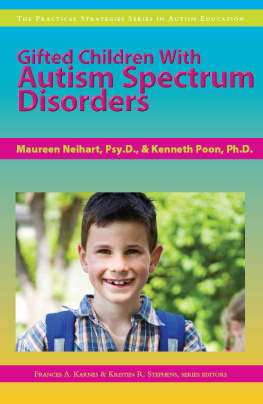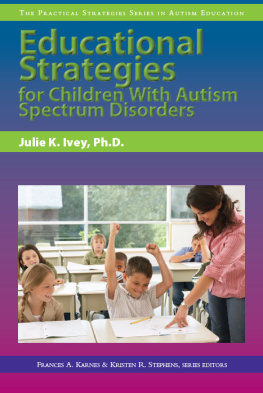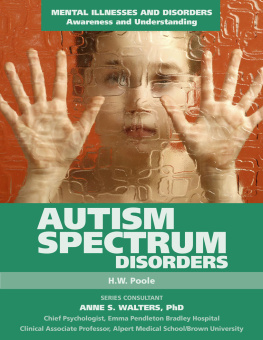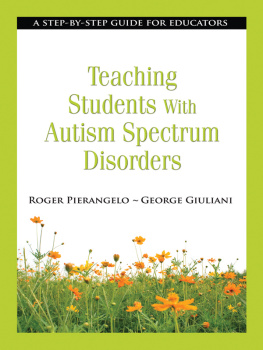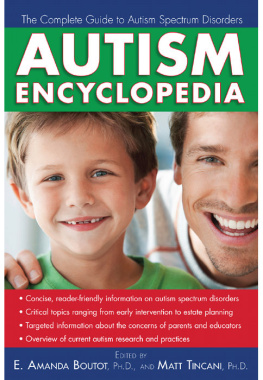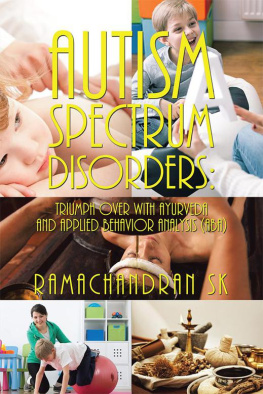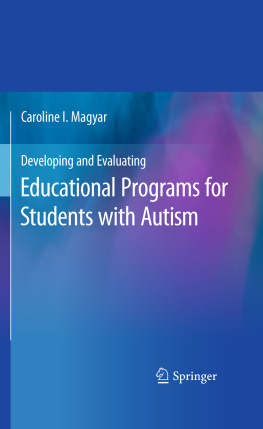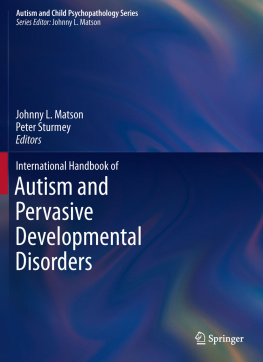For a current listing of available guides within the series, please contact Prufrock Press at 800-998-2208 or visit http://www.prufrock.com.
Introduction
My son received a very late diagnosis of Asperger syndrome (AS). He was 13 years old. He had been called many different things throughout his life. Words such as eccentric, gifted, and shy come to mind. I was always on the sidelines, though, hoping that they were right and I was wrong. It had always seemed to me to be something more, almost inexplicable or intangible. I would question certain inconsistencies, clumsiness, extreme discomfort around strangers, near hysteria at changes in routine, and most important, a complete lack of friendships. On the other hand, mastery scores would be quoted to me. Report cards were waved joyfully. There was a sense of what could be the problem with a mind like this. The answer to that is plenty. (Rietschel, 2000, p. 448)
Autism spectrum disorders (ASD) are developmental disorders characterized by severe deficits in social communication and restricted patterns of interests and behaviors. Prevalence estimates have increased considerably in the last decade, and ASD is now considered to be the fastest growing disability in the United States, affecting approximately 1 in every 150 children ages 310 (Centers for Disease Control and Prevention, 2007). Boys are 34 times as likely as girls to be diagnosed. Separate prevalence rates for gifted children with ASD are not available, although Foley Nicpon, Assouline, and OBriens (2007) study suggested that the rates are similar among gifted boys and girls.
Like other twice-exceptional children, gifted children with autism spectrum disorders are sometimes forced to choose between addressing the concerns of one exceptionality over another, but this is occurring less and less as dedicated teachers and informed parents collaborate to create environments and programming that supports the childs individual profile of abilities. The aim of this volume is to describe instructional and behavior management strategies for the most common challenges teachers face with gifted children with ASD so that the abilities of these children can be developed to their fullest potential.
Characteristics and Needs
Gifted children with ASD are similar to other children with ASD in that they lack the ability to infer information about the internal states of others. They also are often described as having restricted interests, pedantic and monotonic speech, poor social communication (including poor eye contact), little emotional understanding, and poor motor planning. Gifted students with ASD typically have fine motor difficulties, resulting in poor handwriting and difficulty with certain tools in science and technology. Their speech is odd, often pedantic, characterized by one-sided conversations that focus on narrowly defined topics that are of intense interest to them. They have great difficulty with the give and take of normal conversation, and often violate speech boundaries by interrupting, failing to respond, or lecturing excessively. They have trouble stopping themselves once they start talking. They may be highly verbal and possess exceptional vocabularies, but they are unable to make their speech work for them. They convey information, but not in a way that makes connections. They talk at people rather than with them. They understand and use language literally rather than figuratively, missing many of the nuances of social interactions. Their information may be highly accurate, but they fail to understand the tone with which something is said. They exhibit a rigid inflexibility in thought and behavior that is puzzling and problematic at both home and school. However, all of these traits vary widely among children with ASD in their severity and intensity.
In comparison to other gifted children, gifted children with ASD have significant executive function deficits and these cause them ongoing difficulties with multitasking, organization, and auditory processing. Multitasking requires rapid information processing, but children with ASD are typically slow information processors. This means that it takes them longer than other children, and much longer than other gifted children, to do two things at the same time. For instance, listening to the teacher and following her instructions while taking notes is likely to be extremely difficult. An assignment that involves reading and analyzing an essay and writing a short response may take these students 23 times longer than their classmates. It may be nearly impossible for some students to participate in a lively group discussion because they cant track or process the comments of so many people at once.
However, like other gifted children, gifted children with ASD want to work quickly. If they are in accelerated classes or in classes with many other gifted children, they may feel pressured to keep up and be able to complete similar quantities of work in the same amount of time. They may become very frustrated when they are unable to do so, and peers or adults who do not understand the extreme discrepancies and curious nature of their abilities also may inadvertently press them to work more quickly than they can. Behavioral, emotional, and academic problems are likely to ensue when peers and teachers fail to appreciate their slower processing speed and push gifted students with ASD to multitask or to accomplish more than they can in the time provided. Teachers are most helpful when they normalize the students slower processing speed, anticipate the difficulties they will face with a lesson or activity, and adjust expectations.

